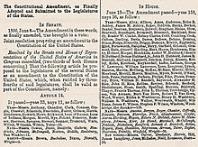
For continuity, you may read about the history of apartheid and Jim Crow laws in the September 22th and October 6th articles.
The 13th Amendment to the Constitution abolished slavery in the United States in 1865. However, government mandated apartheid continued in many states through Jim Crow laws.
The 14th Amendment to the Constitution
Legally enforced segregation by race restricting every aspect of a Black person’s life relegating them to inferior conditions, education, services and restrictions of their rights, including where to live and their voting rights, continued in many states.
The 14th Amendment to the Constitution was ratified in 1868. It attempted to curtail states’ continuing oppression of blacks and infringement of rights via passage of their state and local statutes.
The 14th Amendment to the Constitution, Section One, contains three clauses designed to prevent state laws’ restriction of blacks’ rights:
- The first clause bestowed citizen rights upon them.
- The second clause expanded their legal rights by attempting to protect them from infringement by states through the passage of harsh restrictive state laws.
- The third clause, “nor shall any State deprive any person of life, liberty or property, without due process of law,” expanded the due process clause of the Fifth Amendment to apply to the states.
Amendment XIV, Section 1, states as follows:
"All persons born or naturalized in the United States, and subject to the jurisdiction thereof, are citizens of the United States and of the state wherein they reside. No state shall make or enforce any law which shall abridge the privileges or immunities of citizens of the United States; nor shall any state deprive any person of life, liberty, or property, without due process of law; nor deny to any person within its jurisdiction the equal protection of the laws."
Legally Mandated Segregation by Race Continued after Passage of 14th Amendment
Despite the passage of the 13th and 14th amendments, segregation by race continued through Jim Crow laws and Jim Crow culture. Almost three decades subsequent to the passage of the 14th Amendment, the Supreme Court in 1896 ruled that racially segregated public facilities were legal, so long as the facilities for blacks and whites were equal. Plessy v. Ferguson, 163 U.S. 537, May 18, 1896.
This 1896 ruling by the US Supreme court sanctioned laws barring blacks from sharing the same public facilities including schools, buses, and others facilities used by whites. The Court essentially upheld “Jim Crow” segregation laws by establishing the “separate but equal” doctrine which continued the apartheid in many states for many decades into the twentieth century. The 14th Amendment and the issue of legal segregation figured prominently in cases in the twentieth century.
It took 86 years after the ratification of the 14th Amendment to the Constitution, for the US Supreme Court to overturn the Plessy v. Ferguson decision. It was not until the 1954 that the Supreme Court overturned the Plessy v. Ferguson 1896 decision and the "separate but equal" doctrine. However, subsequently, government mandated apartheid remained the law of the land in many states.
What You Can Do
I am an aggressive and compassionate employment law attorney who is experienced in successfully representing persons who were subjected to racial harassment and retaliation in the workplace and/or were fired. If you have experienced racism at work, or if you reported it and no action was taken, if you are thinking of resigning, or think you will be fired, or have been fired, it is important that you consult with an attorney who is experienced in discrimination.
If you are being subjected to workplace discrimination, contact Hope A. Lang, Attorney at Law today for a free consultation.
Hope A. Lang, Attorney at Law serves clients throughout New Jersey, including Bergen, Middlesex, Essex, Hudson, Monmouth, Ocean, Union, Camden, Passaic, and Morris Counties with locations in southern, central, western and northern NJ to meet with clients.